#lebanese-egyptian artist
Text
ZEINA - Nasty Remix ft. Saint Levant
#zeina#lebanese-egyptian artist#saint levant#palestinian-algerian-french artist#nasty#remix#song of the night#song of the week#song of the year#love songs#song#lovers#beautiful song#english#arab#french#lyrics
9 notes
·
View notes
Text
Hate to say it but the overlap of "has a fanbase that heavily values their writing abilities" and "has a fanbase that deliberately detaches/miscontrues/borderline insults/fetishizes the singer's identity and inspiration from their artistry in an effort to pretend the music is closer to what the fans think they should be" venn diagram is not only just a straight up circle, but has taken over many of the same musicians and the fandoms overlap with each other to such an extreme extent that it sometimes becomes exhausting to consume any of their music as independent artists and then discuss them, let alone seeing how a lot of these artists have a "collective" fanbase that treats them all so bizzarely. Like do y'all not see the pattern with how you always feel some need to focus on certain "nicer" aspects of musicians' identities and entirely disregard others, or be all weird about it when you do acknowledge it? I'll provide examples, hopefully you'll see what I mean.
Tamino is an Egyptian and Lebanese man, at the same time he is Belgian, and that influences his art and it's so weird to just focus just on Persephone and his more "western" songs, or compare his nose to just a bunch of western white men. Hozier is Irish and inspired by Black American musicians who make political music and it's weird when you guys pretend he's just the fairy bog boy, which tbh you also likely wouldn't be saying if he was from Pennsylvania or Manchester or whatever, you're absolutely doing it with him because he is Irish, plenty of other artists write nature themes and don't get that weirdness put on them, you're doing it because he is Irish. Ethel Cain is a Southern American and writes from that very specific experience and has religious themes that influence her music and isn't just some "backwards" "hick" "redneck" (in a derogatory, insulting sense) girl that a lot of you clearly view "people like her" down south as. Måneskin has written in English since the beginning of their career, clearly takes inspiration from English and American musicians, and isn't entitled to write in Italian just because you think they should or because their native language ~fascinates~ you as an english speaker. Mitski often writes from a very VERY obvious perspective of being an Asian American woman and yet so many of you pretend that her songs about that experience are innately applicable to all of womanhood when they clearly aren't. They just aren't. They are about her experience as an ASIAN AMERICAN woman.
There are other artists y'all do this sort of shit to too (mainly Black ones!!) and it's absolutely annoying as shit to see that you can't just appreciate their identities for what they are and still need them to be closer in proximity to you and your identity or needs to "fulfill" something for you as an outsider, to the point of being delusional about the fact that this is all first and foremost their music and that it operates with their identities and they're all fantastic writers because on various levels they're being vulnerable about their identities and selves. That's not to say you can't pull your own meaning from the songs they write or whatever, but when discussing the artists themselves a lot of you are showing your asses with how you view "people like that" and how even though you're not being weird or bigoted in an obvious, deliberately mean sort of way, a lot of you still have shit to unpack and look at before you engage with them and their stuff. I mean Jesus christ even the most surface level understanding of erasure, fetishizing, and sterotypes can show what y'all are doing subconsciously, I'd hate to see how you talk about these people's identities when it's someone you don't see as both a product yet (parasocially) a friend, but is instead someone you hate.
93 notes
·
View notes
Text
— tamino explains why he doesn't like when western media focuses on his identity:
i grew up in belgium, but i have egyptian and lebanese roots. even though i grew up with my belgian mom mainly, she always thought it was important to also let us be in touch with that side of our roots. we had always had arabic music around the house, but also classical, and the pop stuff; the beatles, all that good stuff. so, i have always felt like i had a connection to those roots through music because i don't speak the language, but somehow i always understood the music. it was like a language that i understood. music in general, but also arabic music; learning to play the oud has brought me even closer to it.
as much as i appreciated myself—my roots and everything, it's of course clearly an influence in my music—i don't think it should be the main thing, you know what i mean? like it could easily become a gimmicky thing, "oh yeah. that dude with the arabic thing." in a way i understand the importance of being able to quickly describe an artist, and if you can do that in one sentence and get people interested, that's quite good. if people ask me, "what kind of music do you make?" i usually say, "well, it's sort of melancholic singer-songwriter music with some arabic influence." just to give a quick answer, you know? and then maybe it will spark an interest to check it out. i do think that in general, there's a whole movement of identity politics. and i think in music, in arts, in how we look at artists, sometimes there is a tendency to care more about who the artist is instead of what he makes. and that is something that i personally don't agree with or really connect to. i always think the work comes first. i'm not going to name names, but when i see famous people on television or in interviews, i love them. they're a great personality. they're so good at being a celebrity. but i don't like their work. (esquire interview, 2022)
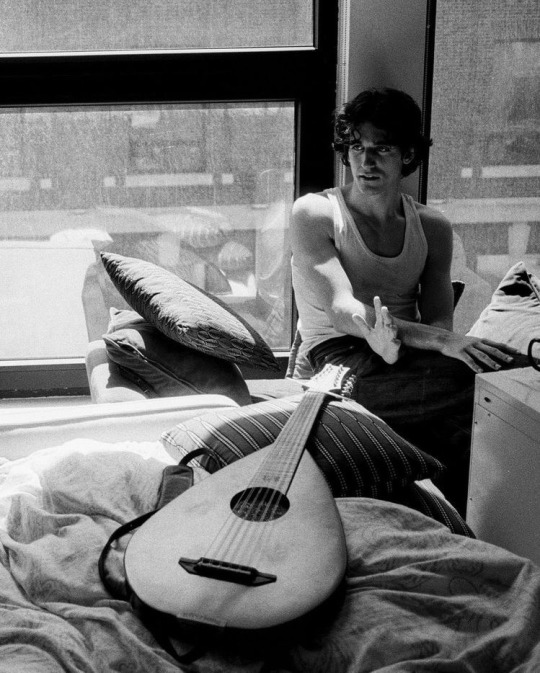
114 notes
·
View notes
Text
Walk down Washington Street in Lower Manhattan between the Battery Parking Garage and Albany Street, and you’ll see virtually no signs that this area was once home to one of the largest communities of Syrians in the United States. Groups [...] have worked tirelessly to preserve the three remaining buildings [...] that stood during the heyday of New York City’s “Syrian Quarter,” or Little Syria. [...] From 1890 to 1940, Little Syria stood as the mother colony to Syrian and Lebanese communities across the United States. The three-block radius around Washington and Rector was home to newspapers, magazines, restaurants, jewelry shops, banks, barbers, grocers, churches, a mosque, record stores. [...] This was the Mahjar, America’s Arab diaspora. [...]
Tucked within these streets were three Arab American record labels -- Maloof Phonograph Company in the 1920s and 1930s, A.J. Macksoud’s Phonograph Company from the 1910s to the 1930s, and Alamphon Records in the 1930s and 1940s -- now among the most recognizable to record collectors.
---
These labels filled an important cultural gap -- by the 1920s, the US’ two big phonograph record companies, Victor and Columbia, cut back on recording and selling Arab music. And while companies like Beirut-based Baidaphon recorded Syrian and Egyptian musicians and sold their records at home [...]in the early 1900s, by the 1910s that was changing. Mahjari musicians in the United States began to record music themselves, for mahjari audiences.
The music that New York City’s mahjari artists performed from the 1910s through the following 30 years included recorded poems, folk songs from the homeland and original compositions telling of loss, love, [...] and favorite foods from home; the names, tunes, beats and rhythms connected them to their roots and shaped their nostalgia for what they had left behind. There was much to miss, even before leaving what was then known as Ottoman Syria: today’s Lebanon, Syria, Jordan and Palestine. The region’s silk industry and other trades were in decline. Political instability and poverty were on the rise. Thousands of former Ottoman subjects soon found themselves in New York City, Boston, Detroit. [...]
---
[T]he performing and literary arts movement that gripped Egypt and Greater Syria during the late 19th and early 20th centuries. That movement was the Nahda, the Arab Renaissance.
The arrival of immigrants from Greater Syria coincided with a boom of gramophone machines, phonograph cylinders and flat-disc records.
And as Arab musicians in Cairo and Beirut recorded music throughout the 1890s and 1900s, thousands of miles away in Little Syria a precocious Alexander Maloof began composing and publishing music for the piano. [...] From a young age, Maloof listened to traditional Arabic music such as mawwal, Arab folk music forms such as the ataaba, and experimented with fusing these with American marches, fox trots, and ragtime.
Meanwhile, by 1907, 29-year-old musician Abraham J. Macksoud, now using the moniker A.J. Macksoud, opened a phonograph record store in Little Syria. [...] Columbia and Victor had already begun to record the songs of mashriqi musicians back home [...], but as late as 1911, no Arab or Ottoman immigrant to the US had recorded specifically for a mahjari audience. That was about to change.
---
On 24 July 1913, Alexander Maloof, now a well-accomplished songwriter and composer, recorded the piano solo B 13834-1, #17443 Al-Ja-Za-Yer (“Algeria”) for the Victor Talking Machine Company. With Maloof's song, Mahjari musicians had now found a home for recording their music. [...]
The number of Syrian Muslims to emigrate to the United States remained relatively small during the first wave of emigration from 1880 to 1941. Still, in 1916, Columbia recorded one of only a few Syrian Muslim immigrants, Mohamed ZainEldeen. Born in Homs, Syria in 1892, ZainEldeeen arrived in New York in May 1912. By the fall of 1916, he had cut seven songs on six double-sided discs for Columbia [...]. As the number of Arab immigrant and Arab American musicians grew on Columbia and Victor’s rosters, A.J. Macksoud moved and opened two new record shops at 52 Broadway and 89 Washington Street. [...]
---
The 1920s marked the era when Victor and Columbia lost their monopoly on lateral-cut recording technology, but it is also the period they slashed efforts to record and issue new Arabic-language music. To fill in the gaping hole left in the industry, [...] pianist and composer Alexander Maloof established his own record label. He kept up a break-neck pace appearing on radio, running his record label, composing songs and selling sheet music to publishers.
In October 1923, Maloof finally recorded his “Egyptian Glide” and a second track, “Pharaoh,” on his label’s pressing company, Gennett Records. And despite its long hiatus of recording Syrian American artists, in 1926 the Victor Talking Machine Company even brought Maloof back into the studios, this time with his larger orchestra, to record “Desert Wail” and “Kurdistan.” [...]
On his self-titled label, Maloof recorded former Victor recording artist Ilyas Wardiny, who became one of the label’s most popular singers. [...]
---
Farid Alam al-Din (anglicized Fred Alam) founded the last of Little Syria’s record labels. For years, historians, ethnomusicologists, and even the most experienced scholars presumed Maloof and Macksoud shared the position of Washington Street’s only Arab American record labels headquartered in the heart of Manhattan.
But as the Great Depression saw Maloof and Macksoud shut down their labels by 1935, Fred Alam opened his store and launched his Alamphon Record label from 81 Washington Street.
---
By then, Little Syria as a whole was already in some form of decline. Whether Alam bought out A.J. Macksoud’s inventory or launched his store anew, a 1935 newspaper article read:
"The Syrian quarter of the town, which for years boasted one of the country’s greatest rag centers, has practically vanished. What remains is in Washington Street down by the Battery. One of the best known is Alfred Alam’s Oriental gramophone record shop. Alam’s phonograph record business is perhaps the only business of its kind not diminished by the radio. [...]”
Little Syria’s Nile Restaurant and the Son of the Sheik restaurant commanded special attention, as did Alfred Alam’s shop. The paper noted “the piles of Egyptian and Syrian Phonograph records at A. Alam’s store. [...]” And yet, that same article also reported the changes that would soon mean Little Syria’s demise, as development and urban renewal programs took hold in Manhattan's Lower West Side.
The construction of the Brooklyn-Battery Tunnel in the 1940s meant the destruction of the tenements that once housed thousands of new immigrants and Syrian Americans. The buildings that contained many of the community’s businesses and meeting places steadily disappeared, never to return. [...]
Few traces remain, except the music records that subsequently scattered across the US, from owner to owner.
---
Text by: Richard M. Breaux. “Songs of nostalgia in New York City’s long-lost ‘Little Syria’“. SyriaUntold. 5 March 2021. Article part of SyriaUntold’s ongoing series on Syrian music. [Bold emphasis and some paragraph breaks/contractions added by me.]
96 notes
·
View notes
Note
I have a question about music! I want to get more into Arabic music (women specifically) but the only Arabic musician I know of right now is Faouzia, who is AMAZING, however she doesn’t have a lot of music in Arabic. She uses cultural inspiration in her music (she’s Moroccan), but only has a couple songs with one Arabic word in it (Habibi & Puppet). I like listening to music in other languages and was hoping maybe you had recommendations for Arabic female musicians
never heard of faouzia! thanks for informing me of her. and yes im gonna first name some famous arabic pop singers and then ill move onto some that i also like:
nancy ajram
this woman is probably one of the biggest popstars in the arab world and has been for decades. she has a lot of great hits and id honestly just recommend going thru her music esp her older stuff bc you might like something in there. shes a lebanese christian
youtube
2. haifa wehbe
not a fan of hers but she has some hits and shes also one of the most renowned popstars.
youtube
3. myriam fares
also one of the bigger popstars, she also tends to play with a lot of arabic genres. shes mostly known for her dancing i think, shes quite talented but im not big on her music (im just sharing my faves btw so this is one of my faves and its clearly awful quality)
youtube
4. ruby
i looooooove ruby she was basically the only dark-skinned woman i saw in mainstream arab media and shes an awful dancer but makes amazing music and is also an actress (and ive heard shes quite good at that too) and is a good singer. also afaik shes one of the few female artists that didnt get plastic surgeries (if she did its so mild that its not noticeable). shes egyptian (previous singers i shared are all lebanese)
youtube
5. shadia mansour
one of the only female rappers i know of, i dont know much of her music but this song is really good and the lyrics are amazing. shes palestinian & british and this song is about palestinian resistance basically
youtube
6. elyanna
this one is more modern than my other recommendations fhsdfhds but shes quite good, iirc shes half palestinian half..chilean? i think?
youtube
7. samira said
shes north african, i Think tunisian, and one of the bigger popstars from the 2000s. i dont really listen to most of her music but this one's a classic:
youtube
8. fairuz
this one's quite old-fashioned but definitely a classic and her music continues to be played a lot today... especially by lebanese people. shes a lebanese singer who i think was really prominent for decades starting from the 50s. not sure how her music will be perceived by someone who didn't grow up hearing it tho. shes also lebanese christian
youtube
9. luka salam
only know one song of hers but its a nice one, the lyrics are great and i was obsessed with it at one point. i know shes got others. idk where shes from tbh
youtube
10. maryam saleh
i only know one song of hers too but its also a nice one. shes egyptian
youtube
adding more in reblogs bc i ran out of links to add lol
22 notes
·
View notes
Note
Hello I was curious if you listened to Egyptian music at all or music from around the Middle East? I've been listening to Lebanese and Egyptian music for over ten years now and I've only been a Kemetic pagan for just over a year and often times I'll have my favorite artists playing when I am thinking about my gods. I've been shy to admit it for the fact that any other time that I listen to music not from the US that I get made fun of and I can't recall meeting anyone who listens to Arabic music.
You are definitely not alone in this! There are a number of people I know from the Kemetic community who enjoy Egyptian and other Middle Eastern music. Maybe some of them will sound off in the replies?
My shameful secret is that I do not listen to much music at all. Like you, I was shamed for my musical interests when I was younger, and it really affected me. I keep telling myself I will get back into music. Maybe some day I actually will!
#kemetic pagan#kemetic fandom#kemetic polytheism#kemeticism#kemetic paganism#kemetic#egyptian paganism#egyptian polytheism
5 notes
·
View notes
Text
This Arab Is Queer, edited by Elias Jahshan
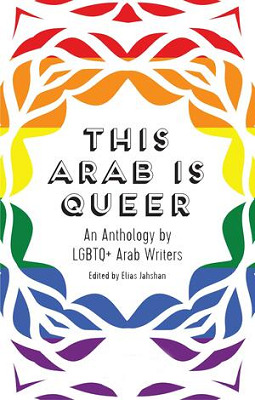
⭐⭐⭐⭐
This collection of eighteen short essays by queer people with roots in the Arab world covers a wide variety of experiences, from gay and lesbian to trans and nonbinary, in many permutations. The content of the essays themselves are as varied as the authors, featuring everything from informative expository pieces(The Artist's Portrait of a Marginalized Man, by Danny Ramadan) to incredibly personal narratives(Return to Beirut, by Saleem Haddad). There's even something that appears to be short fiction(The Bad Son, by Raja Farah) as well as a piece that reads closer to poetry than anything else(Tweets to a Queer Arab Poet, by Omar Sakr). The contributors are Lebanese, Syrian, Sudanese, Iraqi, Egyptian and more, raised in both the Arab world and in the diaspora. The variety of voices featured, and the differing ways they choose to express their queerness, is this book's greatest strength.
There was little that really bothered me. Some essays were better than others. As mentioned in the introduction, there is some sexual content, both discussed and depicted in narrative form. I wasn't so much a fan of the latter(sex scenes in nonfiction always get me like that, it's too personal), but I understand why it was included from an artistic standpoint. My biggest complaint is that the included glossary was largely useless. Most of the terms in it were explained or translated in the works themselves, and every time I was unsure what a thing or phrase was, it was never in the glossary!
I recommend this book to anyone — LGBTQ or otherwise — who has an interest in exploring intersectional queer identities.
22 notes
·
View notes
Text
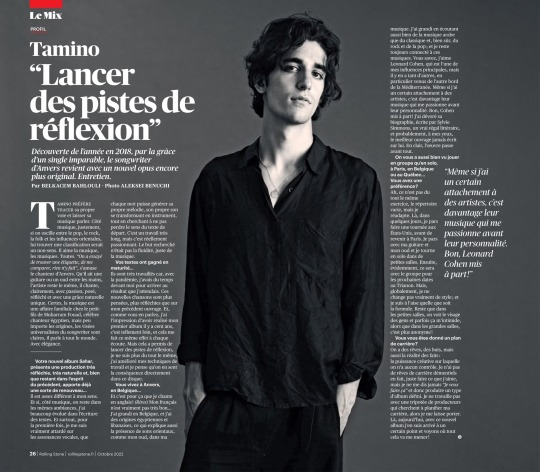
— Tamino for Rolling Stone France (x) (x)
(Original French text)
Tamino
“Launching Thought Lines"
Discovery of the year in 2018, thanks to an unstoppable single, the songwriter from Antwerp returns with a new, even more original opus. Interview.
By BELKACEM BAHLOULI - Photo ALEKSEI BENUCHI
TAMINO PREFERS TO MAKE his own path and let his music do the talking. In terms of music, precisely, if we oscillate between pop, rock, folk and oriental influences, finding a classification for it would be nonsense. He loves music, musics. All. “We tried to find a label, to compare myself, nothing helped,” laughs the singer from Antwerp. Whether he has a guitar or an oud in his hands, the artist remains the same, he sings, clearly, with passion, composed, thoughtful and with a unique natural grace. Admittedly, music is a family affair for the grandson of Muharram Fouad, a famous Egyptian singer, but regardless of his origins, the universalist aims of the songwriter are clear, he speaks to everyone. With elegance.
⎯⎯⎯⎯⎯⎯⎯⎯⎯⎯
Your new album Sahar, presents a very thoughtful, very natural production and, although remaining in the spirit of the previous one, already brings a kind of renewal...
It's quite different in my opinion. And if, on the music side, we stay in the same atmospheres, I have evolved a lot in the writing of the texts. And above all, for the first time, I really focused on the vocal assonances, that each word could generate its own melody, its own sound transforming into an instrument, while trying not to lose the meaning of the original text. It's a very long job, but it's really exciting. The goal was not fluidity, just music.
Your texts have matured...
They are very well elaborated because, with the pandemic, I had time ahead of me to achieve the result I expected. These new songs are more thought out, more thoughtful than on my previous work. And, as you mention it, I feel like I made my first album a hundred years ago, it's so far away, and it has the same effect on me every time I listen to it. But it allowed to launch avenues of reflection, I am no longer the same, I improved my working techniques and I think that we feel the consequence directly in this disc.
You live in Antwerp, Belgium…
And that's why I sing in English! (Laughs) My French is really not very good… I grew up in Belgium, and I have Egyptian and Lebanese origins, which also explains the presence of oriental sounds, like my oud, in my music. I grew up listening to Arabic as well as classical music and, of course, rock and pop; and I always stay connected to these musics. You know, I love Leonard Cohen, who is one of my main influences, but there are so many others, especially from across the Mediterranean. Even if I have a certain attachment to artists, it is more their music that fascinates me before their personality. Well, Cohen aside! I devoured his biography, written by Sylvie Simmons, a real literary treat, and probably, in my eyes, the best book ever written about him. Clearly, the work comes first.
We've seen you play in groups as well as solo, in Paris, Belgium or Quebec… Do you have a preference?
Ah, it's not at all the same exercise, the repertoire varies, but I readjust. There, in a few days, I'm going on a tour of the United States, before returning to Paris. I leave with my guitar and my oud and I tour solo in small venues. Then, of course, it will be with the group for the next dates at the Trianon. But, overall, I don't really change my style; and I am comfortable whatever the formula. Still, in small venues, you see people's faces and sometimes that intimidates me, whereas in large venues, it's more anonymous!
“Even if I have a certain attachment to artists, it is more their music that fascinates me before their personality. Well, Cohen aside!”
Have you given yourself a career plan?
We have dreams, goals, but also the reality of facts: the creative power over which we have no control. I don't have any crazy career dreams actually. Just doing what I love, but I never say to myself “I want to do that” and therefore produce a certain type of album. I don't work with a slew of producers looking to plan my career, so I just go with it. There, today, with this new album I have reached a certain point and let's see where all this will take me!
#tamino#tamino amir#rolling stone#article#interview#french#2022#without photoshoot#english translated text#thank you to cinemalamet on twitter for helping me proofread the translation <3#screenshot from vk
28 notes
·
View notes
Text
Aya Metwalli & Calamita - Al Saher - Middle Eastern music meets skronk
CALAMITA = KARKHANA members TONY ELIEH, SHARIF SEHNAOUI and Lebanese drummer MALEK RIZKALLAH join forces with the Egyptian singer AYA METWALLI - the result is the improbable meeting between free jazz / improv, punk rock & Oum Kalthoum!
CALAMITA is the “rock project” of SHARIF SEHNAOUI and TONY ELIEH, two of the most active musicians on the Lebanese experimental scene (among others projects, both are members of the “free Middle Eastern music” collective KARKHANA). SEHNAOUI comes from a jazz and improv music background, ELIEH is primarily a rock musician and founding member of the Lebanese post-punk band THE SCRAMBLED EGGS whose work in the last decade has covered many directions from pop-rock to plain experimental. They are joined by Lebanese drummer MALEK RIZKALLAH (WHO KILLED BRUCE LEE, ex THE SCRAMBLED EGGS). As trio they develop instrumental pieces that draw their inspiration from artists as diverse as Tony Conrad, Last Exit or Oum Kalthoum.
AYA METWALLI is an Egyptian singer/songwriter, composer and sound artist currently based in Beirut. Grown up in Cairo, her father would play non-stop Oum Kalthoum songs on road trips to the beach and Aya’s mother; known to have the most beautiful voice in the family, she always sang at home and at family gatherings, so long before Aya was able to form her own music taste, immense amounts of Arabic classic songs and melodies already settled in her subconsciousness
Musicians:
Aya Metwalli: voice,guitar,electronics
Sharif Sehnaoui: electric guitar
Tony Elieh: electric bass
Malek Rizkallah: drums
6 notes
·
View notes
Text
This week in events
20/6/2022, egypt. Mohamad Adel, a student at Mansoura University in Egypt stabbed his classmate Nayra Ashraf to death, in front of the university gate. He was promptly arrested and handed over to the police. Rumors emerged of a dispute between the killer and the victim that led him to commit his crime, but the victim's friends reported Nayra had refused Adel's proposal to marry him and he had vowed that “if I can't have you, I'll kill you.” Predictably, some media reports blamed the victim, questioning why she went to university that day when she did not have exams. Other reports also gave the offender mitigating reasons, arguing that he suffered from neurological diseases and was addicted to drugs.
20/6/2022, lebanon. Mohammad Q. Violently assaulted his 30 year old wife. She was hospitalized in critocal condition due to severe internal bleeding and underwent surgery to remove her spleen and treat 4 rib fractures. The husband went into hiding after commiting the deed. People close to her reported that she was a victim of domestic violence for years.
22/6/2022, lebanon. Syrian and lebanese agriculture workers filed a claim against charbel Tarabay. 17 of them went to majdel baana to work in cherry picking, Tarabay accused them of theft after which they were tortured. The oldest of the syrian workers is a 17 year old. After Tarabay led them to a police station where members of military intelligence found out about the torture but did not write up a report nor offer assistence to any of them.
23/6/2022, jordanian nursing student Iman Irshaid was killed after a man shot her in the head. He chased her and fired 5 times. The killer has not been identified (as far as i know.) The killer left her a message on a university confession page that said if she rejected him he'll kill her "just like the egyptian killed the girl today".
24/6/2022 Lesbian lebanese stand up comedian (shaden fakih) was court martialled because of a video she posted during lockdown when there was a curfew, where she phoned the internal security forces emergency line asking how to obtain pads without leaving her house. She was fined with 1,858,000 lbp (roughly a thousand dollars on the official rate, 64 dollars on today's black market rate as i type this)
24/6/2022 Lebanese interior minister issued a "very urgent" circular banning lgbtq+ gatherings (artistic, cultural, panels, discussions....) based on "calls made by religious figures".
And many many more things that i cant type anymore
#didnt include sources since im translating but like you can google this stuff it'll probably show#abuse#death#domestic abuse#homophobia#misogyny#violence#idk. ask to tag if i missed something
16 notes
·
View notes
Photo
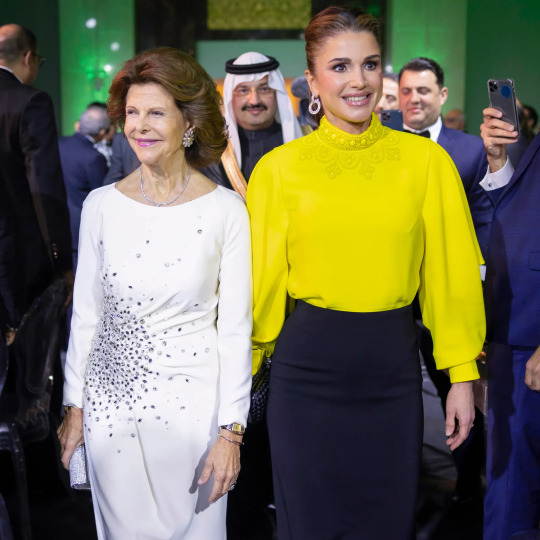
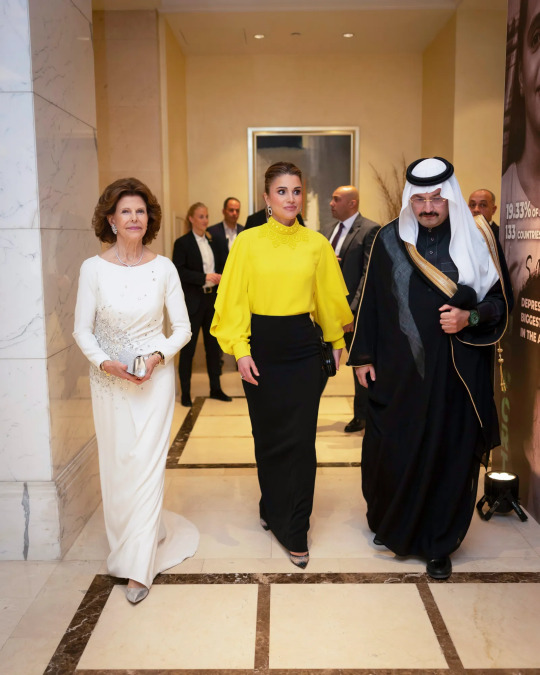

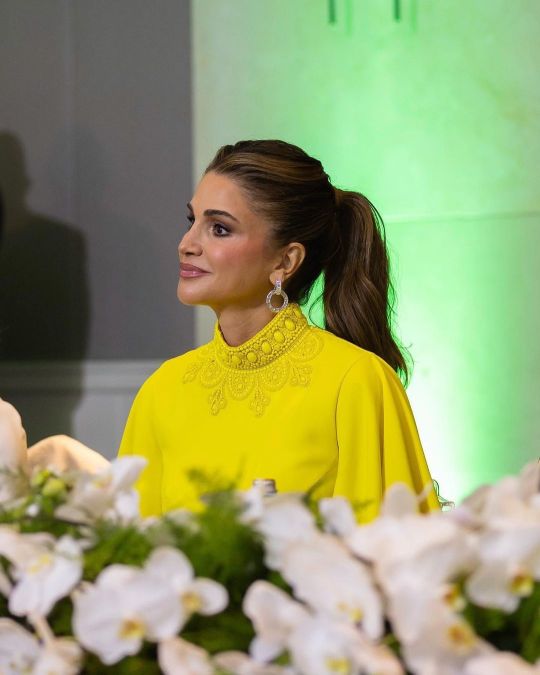
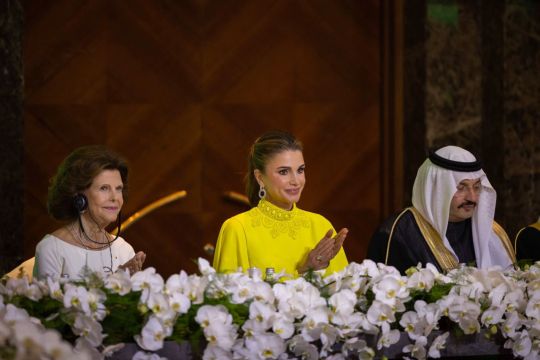

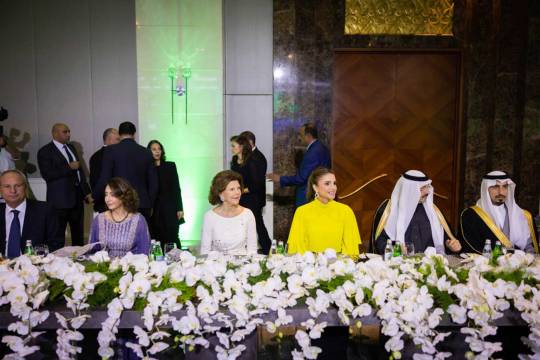

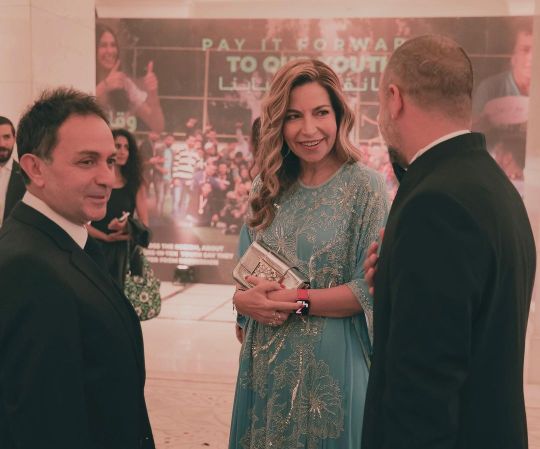
25 October 2022: Queen Rania attended a fundraising dinner for Mentor Arabia in Amman in the presence of Queen Silvia of Sweden, President of Mentor International, and Prince Turki bin Talal bin Abdulaziz, Chairman of Mentor Arabia.
Held under the patronage of Queen Rania, the fundraiser supported Mentor Arabia's work in the field of youth empowerment, with proceeds going toward the implementation of its awareness and prevention programs and projects in Jordan and the Arab World. The event was attended by more than 450 guests from around the world, including several members of the Royal Family and a number of ministers and diplomats operating in Jordan.
Mentor Arabia, a regional branch of Mentor International, is a non-governmental organization that aims to empower children and youth to lead healthy lives and make sound decisions. Established in 2006, Mentor Arabia opened its official Jordanian office earlier this month. (Source: Petra)
Speaking at the event, Her Majesty Queen Silvia expressed her delight at the establishment of the Mentor Jordan chapter. She also praised Mentor Arabia's work developing the capacities of children and youth to prevent them from engaging in risky behaviors such as drug, alcohol, and tobacco use, stressing the organization’s efforts to improve youth mental health through awareness programs.
In his remarks, His Royal Highness Prince Turki bin Talal bin Abdulaziz presented highlights from Mentor Arabia’s 15-year journey, through which the organization has provided opportunities for Arab children and youth to develop their self-confidence and confront all forms of risky behaviors.
Mentor Arabia Executive Director, Thuraya Ismail, emphasized the organization’s mission, saying, "The essence of everything we do is to make a positive impact on the lives of children and youth through our targeted awareness programs and our effective partnerships with governments, the private sector, international organizations, media and academic institutions, and others."
The event included the announcement of the winners of the third edition of the Mentor Arabia Youth Social Entrepreneurs Award, in partnership with Zain Jordan, Al Jude for Scientific Care, and the Netherlands-based TUI Care Foundation, which spotlights youth achievements in the fields of humanitarian and social development. In collaboration with the Crown Prince Foundation, the award winners will offer mentoring sessions to their Jordanian peers, aiming to inspire and motivate them to give back to their communities.
Hosted by media personality Rabia Al-Zayyat, the fundraiser included performances by Lebanese musician Michel Fadel, Egyptian Singer Abu, Jordanian singer Nadine Tayseer, and French artist Dieze, accompanied by the Amman Chamber Orchestra.
Mentor Arabia is a regional branch of Mentor International, a global non-governmental organization established by Queen Silvia of Sweden in 1994, with national chapters in Europe and the United States.
In partnership with the Ministry of Health, Mentor Arabia has collaborated with the Royal Health Awareness Society on its Generations Protected initiative, spreading awareness on protecting children and youth from the dangers of addiction.
5 notes
·
View notes
Photo
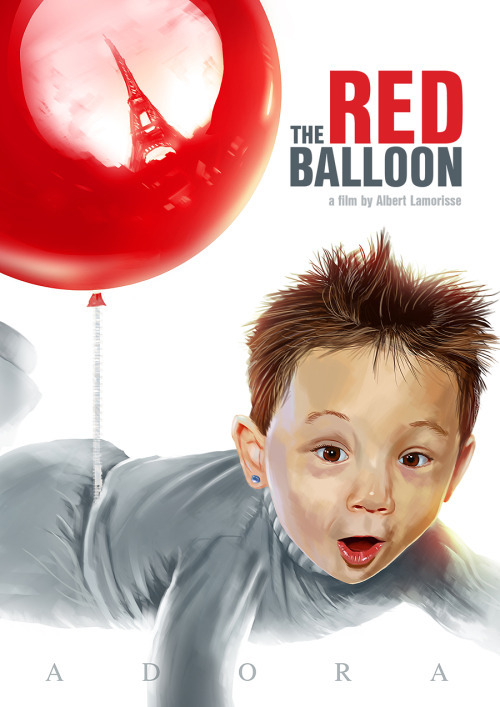
Movies I watched this Week #104 (Last week of year # 2):
Cairo Station by renowned director Youssef Chahine, my first from the Golden Age of Egyptian cinema. A 1958 Neo-realist story of a lowly (and horny!) newspaper vendor who loses his mind after being sexually obsessed with a luscious lemonade seller. Sharp descriptions of poor, working class individuals, unexpected sensuality and descent into madness is not what you’d expect from the low-brow melodramas of that time. 7/10.
🍿
Heaven without people is a beautifully-written, award winning family drama by a Lebanese play writer Lucien Bourjeily, his debut feature. It was shot entirely in one regular middle class apartment, and featuring about 15 not-actors, including some kids. It realistically tells of a large Christian family who gather for Easter feast, for the first time in two years. It’s conversation heavy and tightly-played. The busy, friendly interactions between all members of the family eventually turns into discord, and ugly secrets emerge. Well worth watching. 8/10.
🍿
Fear and desire, 24-year-old Stanley Kubrick’s debut feature. A somehow amateurish anti-war production which cost $10,000 raised from Kubrick’s family. It follows 4 soldiers behind enemy lines, with Paul Mazursky as the delirious young one. “Not his best work”.
🍿
The documentary Three Minutes – A Lengthening uses a unique approach: It tries to deciphers a clip from a 16mm holiday movie which was found in somebody’s closet, without adding any additional footage to it. In a voice over it tells of the detective work that it took to unpacks what’s there, and it lets only the visuals from the clip to speak for themselves.
The 3 silent minutes are from a trip that some American Jew took in 1938 to his small birth village in Poland. All that we see are some streets, a public square, and about 150 random people who were there on that day, most of them looking at the movie camera, which was a novelty. It’s a haunting snapshot, because it’s so completely mundane. Still, as the grandson of the photographer explores, only about 3% of these 3,000 Nasielsk Jews survived the holocaust. So all the curious, smiling, randomly waving people became ghosts. Co-produced by Steve McQueen. 8/10.
🍿
5 more by Robert Redford and 3 more by J. C. Chandor:
🍿 ...I'm doing a survey... do you believe the Condor is really an endangered species?...
Another perfect Christmas re-watch: Three days of the Condor, one of my all time favorite conspiracy thrillers from the 70′s, and really, one of my top 50 films of all time. Every word I wrote about it last year, when I saw it last time is till in play. 10/10.
🍿 I loved J. C. Chandor‘s ‘Margin Call’ and ‘A most violent year’, but I hesitated watching his tremendous ‘Old man and the sea’ masterpiece All is Lost. And even when I started, I had a hard time staying in, and had to take frequent stops, Not that it’s not all-immersing and original. But the harrowing, no-words, single player (no-)survival story of a man lost at sea is so dispiriting, so nerve-racking, it took me three days to finish it. 9/10 for being too tense.
🍿 In György Pálfi’s immersive mashup Final Cut, Ladies and Gentlemen, Redford only appears for a brief moment. That’s because it is a ‘supercut’ of over 450 clips from the most famous films in history. It’s a meta-love story, told through a montage of scenes edited together from all those other films. Absolutely fantastic. Another inspired re-watch from last year.
🍿 "...Stay away from the chocolate mousse”...
Years before winning an Oscar for ‘The Artist’, French director Michel Hazanavicius created a similar montage in La Classe Américaine. Recieving permission from Warner Brothers he cut and pasted scenes from about 50 of their old movies into a nonsensically-funny, politically-incorrect and unexpected hillarious parody. It mostly follows Robert Redford, Dustin Hoffman and Paul Newman, silly journalists at the Washington Post, who interview dozens of classic stars as they try to understand John Wayne’s last words, “Monde de Merde”. Dubbed into ridiculous French, full of cursing, off color jokes about butt sex and bad digestion. Worth the watch!
🍿 A River Runs Through It was the third film directed by Redford. A long, beautifully-shot and utterly uninteresting period piece of two uninteresting brothers in pastoral Montana in the 1920′s. 3/10.
🍿 So I was finally also able to watch J. C. Chandor‘s last feature film, Triple Frontier. Each of his 4 films is in a different genre. This one is a standard action-adventure flick, where ex-Delta Force Oscar Isaac is getting the old team together for one last big deal, stealing millions from a Colombian Narco lord. Even though the story and action were not original, it was extremely well-done. 8/10.
🍿 And even though I’ve seen Chandor’s Margin Call 4 times already this year, and again today, I am becoming convinced that this is of the best debut features of all time, and one of the greatest films of the 21st century.
Repeat viewings prove to me that his control of sound, design and editing is masterful: The opening scene’s score. Every single scene is perfect. Every new chapter in this evolving story unfolds like a play. Absolutely fantastic - 10/10 again.
🍿
I have a new favorite sub-genre: Debut fictional masterpieces by young(ish) female film directors. Recent examples: Quinn Shephard (Blame), Alice Wu (Saving Place), Deniz Gamze Erguven (Mustang), Bora Kim (House of hummingbird), Céline Sciamma (Water lilies), Kaouther Ben Hania (Beauty and the dog), Chloé Zhao (The Rider), Lulu Wang (The Farewell), Andrea Arnold (Wasp), Charlotte Wells (Aftersun), Debra Granik (Winter’s bone), Mia Hansen-Løve (Goodbye first love), and so many others.
So, I’m happy to add Kelly Fremon Craig‘s The Edge of Seventeen to the list. It’s a coming-of-age drama about best friends Hailee Steinfeld and Haley Lu Richardson, whose friendship is tested when one of them sleeps with the other’s hot brother. Her only feature since 2016? At least it’s good to read that she is now filming ‘Are You There God? It's Me, Margaret’ now.
The sweetest discovery of the week - 8/10.
🍿
2 French classics:
🍿 Re-watch: The perennial French bonbon The Red Balloon. A nostalgic, heart-warming throw-back to Belleville after the war, the innocence of childhood and bond between sentient beings. 100% enjoyment and guaranteed satisfaction. One of Adora’s beloved early films. (Poster Above).
I was surprised to learn that Albert Lamorisse, who directed both his kids in this gem, was also the inventor of the board game ‘Risk’, and that he died young at a helicopter crash in Iran.
🍿 The old man and the boy (”The Two of Us”), Claude Berri’s humane debut film from 1967. Very old provincial anti-Semite Michel Simon takes in a small refugee boy in occupied France, not realizing that he is Jewish. That the old, bigoted farmer was also a vegetarian was a testament to the well-balanced film, among the first to depict Nazi sympathizers with understanding.
🍿
Fred Zinnemann’s award-winning western High Noon, with just-retired but duty-bound marshal Gary Cooper abandoning his 30-years-younger, newly-married Grace Kelly bride, in order to save the town’s citizens.
There were only two questions that remained unanswered: 1. Why was he so unpopular that nobody would help him? And 2. Why could they not pick a more memorable ‘Baddie’ to stand up against? 9/10.
🍿
I was a big Beatles fan in my teens. When Help opened in Israel I was 12, maybe 13. I went to the small cinema in Hadar neighborhood in Haifa, and saw it 11 times. It was my movie. Peak swinging 60's. The music is still 10/10.
🍿
‘The Olsen Gang’ was a Danish series of 14 comedy films, that was extremely popular all over Scandinavia 50 years ago. They were low-brow farces that provided escapist entertainment based on broad stereotypes. The stories were about the three inept, bumbling small-time crooks always trying to get rich quick. The Olsen Band (1968) was the first in the series. It didn’t age well, but it was nice to see all the familiar locations from around here as they looked then. Interestingly, since Denmark was the first country to legalize pornographic images in 1969, there are some lewd subplots and x-rated stories in this family-friendly romp.
...Det er skide godt, Egon!...
🍿
2 with professional wrestler Dave Bautista and 2 with Udo Kier:
🍿 “Jared Leto's hard kombucha...”
I hated the new Glass Onion from the very first scenes, and had a hard time sitting through this boring, tricked-out big-budget spectacular. A typical turd from the Netflix-Hollywood-Complex cookie cutter, as bogus as Daniel Craig’s fake accent, or as the deceptive ‘Eat the Rich’ sub-text messaging, everything about it was irritating, over-the-top cringe.
The original ‘Glass Onion‘ was so much better.
🍿 The premise is very appealing: A quirky crime drama directed by Werner Herzog, produced by David Lynch, starring Michael Shannon as a mentally-disturbed spiritual seeker who kills his mother with ceremonial sword and Willem Dafoe as a San Diego detective, and mixed with a score of wistful Peruvian folk music. But My Son, My Son, What Have Ye Done was random, misdirected, awful on every other level. 2/10.
🍿 “... Excuse me I’d like to ass you a few questions ..”
An immature, funny re-watch: Jim Carrey big breakthrough Role Ace Ventura: Pet Detective. With Hector Salamanca as Mr. Shickadance, Ace's landlord, and Sean Young as Einhorn-Finkle and some unnecessary homophobic ending. I forgot that at the 45:00 time stamp, at exactly half-point, he fucked Courteney Cox 3 times, with all his house pets watching.
🍿
First watch of the last film that Walt Disney was personally involved with, The Many Adventures of Winnie the Pooh from 1977. Target audience must have been 3-4-year-olds.
🍿
First watch: Peter Bogdanovich’s screwy comedy What’s Up, Doc, with the quintessential San Francisco setting. Madeline Kahn’s debut film. Not as zany today as it might have been then. It only got mildly funny toward the final car chase. 2/10.
🍿
Christmas Comes But Once A Year: A 1936 animated short produced by Fleischer Studios, featuring Professor Grampy, in his only appearance without Betty Boop. What a different consciousness the world will have if Fleischer would have dominated Disney.
🍿
A constant re-play in the background while I go about my day: Sol by Alep!
🍿
Throw-back to the art project:
Three Days of the Condor Adora (Again).
Red Balloon Adora (One of the first illustrations that I really loved).
🍿
(My complete movie list is here)
3 notes
·
View notes
Note
Hello muns of the greatest and most helpful blog in the entirety of the rpc!!!! I need a bit of help. The ideal fc for the blog I’m thinking about making is Taz Skylar, however unfortunately he has like zero gifs on the entirety of the internet it seems. So I was wondering if you could recommend some alternate fcs for him? I’d appreciate the help! Thank you 🙏🏾
Haaz Sleiman (1976) Lebanese - is gay.
Riz Ahmed (1982) Pakistani - had blond hair in Sound of Metal.
Çağlar Ertuğrul (1987) Turkish.
Zeeko Zaki (1990) Egyptian.
Mena Massoud (1991) Coptic Egyptian.
Ramy Youssef (1991) Egyptian.
Jade Hassouné (1991) Lebanese - is queer - has had short dyed hair.
Mandy Sekiguchi (1991) Japanese / Nigerian.
Jacob Artist (1992) African-American / Polish - had blond hair in Now Apocalypse.
Kofi Siriboe (1994) Ghanaian.
Ryan Potter (1995) Japanese / Ashkenazi Jewish, Swedish, English, German, Scots-Irish/Northern Irish - is queer - had blond hair in Genera+ion.
Boun Noppanut Guntachai (1995) Thai.
Rish Shah (1995) Indian - has short dyed hair in Do Revenge.
Aria Shahghasemi (1995) Iranian.
Brandon Perea (1995) Puerto Rican / Filipino - is blond in Nope.
Michael Evans Behling (1996) Nigerian / German.
Emilio Sakraya (1996) Moroccan / Serbian.
Josh Heuston (1996) Sri Lankan.
Evan Mock (1997) Bisaya Filipino / Unspecified White - has short dyed hair.
Archie Renaux (1997) Indian and English - had blond hair in Gold Digger
Omar Ayuso (1998) Moroccan / Spanish - is gay.
Hey anon! Taz is Unspecified Arabic / British so here are some general suggestions with resources based off vibes!
2 notes
·
View notes
Photo
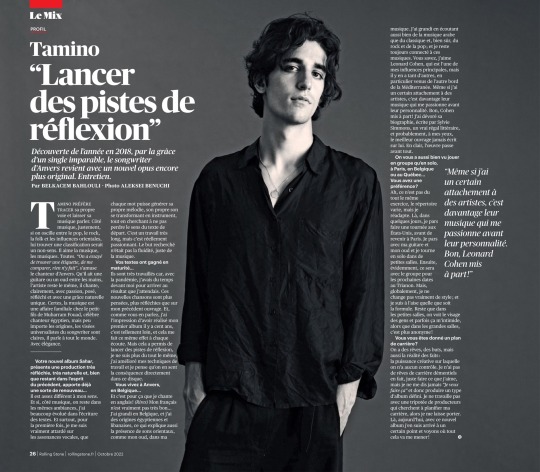
— Tamino for Rolling Stone France (x)
English translated text under the cut:
Tamino
“Launching Thought Lines"
Discovery of the year in 2018, thanks to an unstoppable single, the songwriter from Antwerp returns with a new, even more original opus. Interview.
By BELKACEM BAHLOULI - Photo ALEKSEI BENUCHI
TAMINO PREFERS TO MAKE his own path and let his music do the talking. In terms of music, precisely, if we oscillate between pop, rock, folk and oriental influences, finding a classification for it would be nonsense. He loves music, musics. All. “We tried to find a label, to compare myself, nothing helped,” laughs the singer from Antwerp. Whether he has a guitar or an oud in his hands, the artist remains the same, he sings, clearly, with passion, composed, thoughtful and with a unique natural grace. Admittedly, music is a family affair for the grandson of Muharram Fouad, a famous Egyptian singer, but regardless of his origins, the universalist aims of the songwriter are clear, he speaks to everyone. With elegance.
⎯⎯⎯⎯⎯⎯⎯⎯⎯⎯
Your new album Sahar, presents a very thoughtful, very natural production and, although remaining in the spirit of the previous one, already brings a kind of renewal...
It's quite different in my opinion. And if, on the music side, we stay in the same atmospheres, I have evolved a lot in the writing of the texts. And above all, for the first time, I really focused on the vocal assonances, that each word could generate its own melody, its own sound transforming into an instrument, while trying not to lose the meaning of the original text. It's a very long job, but it's really exciting. The goal was not fluidity, just music.
Your texts have matured...
They are very well elaborated because, with the pandemic, I had time ahead of me to achieve the result I expected. These new songs are more thought out, more thoughtful than on my previous work. And, as you mention it, I feel like I made my first album a hundred years ago, it's so far away, and it has the same effect on me every time I listen to it. But it allowed to launch avenues of reflection, I am no longer the same, I improved my working techniques and I think that we feel the consequence directly in this disc.
You live in Antwerp, Belgium…
And that's why I sing in English! (Laughs) My French is really not very good… I grew up in Belgium, and I have Egyptian and Lebanese origins, which also explains the presence of oriental sounds, like my oud, in my music. I grew up listening to Arabic as well as classical music and, of course, rock and pop; and I always stay connected to these musics. You know, I love Leonard Cohen, who is one of my main influences, but there are so many others, especially from across the Mediterranean. Even if I have a certain attachment to artists, it is more their music that fascinates me before their personality. Well, Cohen aside! I devoured his biography, written by Sylvie Simmons, a real literary treat, and probably, in my eyes, the best book ever written about him. Clearly, the work comes first.
We've seen you play in groups as well as solo, in Paris, Belgium or Quebec… Do you have a preference?
Ah, it's not at all the same exercise, the repertoire varies, but I readjust. There, in a few days, I'm going on a tour of the United States, before returning to Paris. I leave with my guitar and my oud and I tour solo in small venues. Then, of course, it will be with the group for the next dates at the Trianon. But, overall, I don't really change my style; and I am comfortable whatever the formula. Still, in small venues, you see people's faces and sometimes that intimidates me, whereas in large venues, it's more anonymous!
“Even if I have a certain attachment to artists, it is more their music that fascinates me before their personality. Well, Cohen aside!”
Have you given yourself a career plan?
We have dreams, goals, but also the reality of facts: the creative power over which we have no control. I don't have any crazy career dreams actually. Just doing what I love, but I never say to myself “I want to do that” and therefore produce a certain type of album. I don't work with a slew of producers looking to plan my career, so I just go with it. There, today, with this new album I have reached a certain point and let's see where all this will take me!
#my screenshots#musicians#tamino amir#thank u to cinemalamet on twt for helping me proofread the translation <3#screenshot is from vk#tamino
4 notes
·
View notes
Note
🎶✨when u get this, list 5 songs u like to listen to, publish. then, send this ask to 10 of your favorite followers (positivity is cool)🎶✨
hey there ~ these days i like to listen to the birds outside 👀
have trouble thinking of any songs without a ~ category of sorts ~ so here's a few random songs / artists I like for Arabic and Hebrew !!
✧ A-WA | Malhuga I also really like many of their other songs like the softer "Shama'a" - idk what dialect your learning but for me Yemenite is one of my favourites ^^ and the lyrics are beautiful!!!
✧ Mohamed Mounir | Shababeek kind of a random old Egyptian song i know but i love the violins and the window melancholy vibes yknow
✧ Mike Massy | Tannoura Maxi I heard this on a festival once and the little "yadadai~" part has been in my head ever since!! Lebanese singer, very clear pronunciation and videos with lyrics and English tranlation (Arabic and French songs!) so I think they'll be nice for someone studying Arabic ^^
✧ Ofra Haza | גורל אחד + שחרחורת
...
✧ again either 6 or 4 depending on how you look at it but this is where my brain ends!
4 notes
·
View notes
Text
Egyptian Jews in Brazil mark seventy years since their exodus
Jews expelled from Egypt who resettled in Brazil are finally telling their story in an exhibition in Sao Paulo.
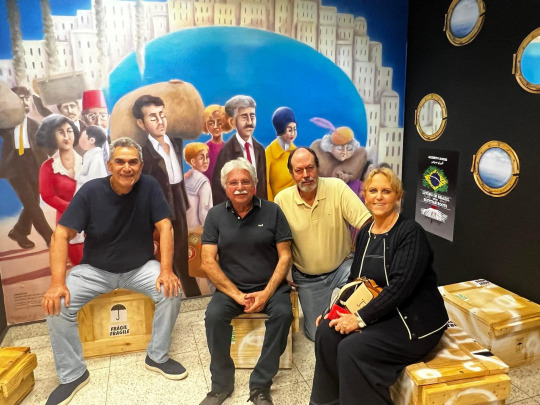
Visitos to the Jews of Egypt exhibition sit on replica wooden crates against a backdrop by Artist Camille Fox
. The very first Jews in Brazil were Sephardim fleeing the Inquisition, They relocated from Recife to Dutch colonies in north America in the 17th century.
In modern times, 1,500 families emigrated to Brazil from Egypt. They are one of three Sephardi communities in Brazil. Jews arrived in the 19th century from northern Morocco to profit from the Amazonian rubber boom. Small communiies still exist in Belen and Manaus in the north of the country.
Almost the first thing visitors see at Sao Paulo airport is a branch of Safra bank, established by a lebanese-Jewish family from Beirut. In the 1950s and 60s, Jews resettled in Sao Paulo from Syria and the Lebanese town of Saida (Sidon).
Numbering 8,000 people in a mainly Ashkenazi community of 100,000, the Jews from Egypt barely warranted a paragraph of explanation at Sao Paulo’s Jewish Museum. And so they decided to tell their own story.
The exhibition marks 70 years since the Free Officers’ coup deposed King Farouk. The writing was on the wall for the Jewish community: 25,000 were expelled after the Suez crisis.
In the 1950s Brazil was seeking to attract immigrants. Jewish employees of US multinational companies were able transfer their jobs to Sao Paulo, the commercial capital. Others were assisted by the refugee agency HIAS which never demanded repayment of financial support. Some children were offered free places at Jewish schools.
About half the Egyptian Jews arrived stateless in Brazil. Some acquired Iranian nationality. One moved from France in the 1950s but threw his French passport in the Seine when he was called up to the army to fight in the Algerian war. He bought an Iranian passport and left for Brazil.
The refugees were not allowed to take more than 20 dinars out of Egypt. They filled wooden crates with clothing and hid jewellery in the base. They also brought odd items like a coffee grinder, a device for chopping herbs to make the traditional molokheya or a police First Aid manual.
The crates were used for sleeping until the refugees could afford to buy a sofa bed in part exchange.
The exhibition Judeus de Egipto: 70 anos de exilio is on at Hebraica, Sao Paulo until 17/July 2022.
6 notes
·
View notes